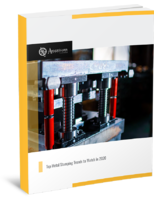Top 4 Things to Consider when Selecting a Commercial Heat Treater
Former UCLA basketball coaching legend, John Wooden, once famously said, "If you don't have time to do it right, then when will you have time to do it over." Not only should tooling and machining organizations select a commercial heat treater that follows this sage advice, but they should also consider the following when evaluating and choosing their commercial heat treater:
1. Commitment to Quality - Companies that manufacture and machine parts that subsequently need to be heat treated are under tighter and stricter timelines and schedules for deliveries to their customers. Consequently, they should select a commercial heat treater that:
o Promotes and maintains a company culture of operating excellence and high quality standards.
o Is trustworthy and will always tell the truth and report the facts regardless of the circumstances - and does NOT take shortcuts in providing its services (ie.
gives a part two tempers instead of three).
o Has in place a well documented quality system to ensure consistency and reliability of processes and results.
o Values and retains highly experienced and highly skilled heat treating staff who continually receive on the job training and are well versed in the handling
and safeguarding of customer parts.
o Posseses up-to-date and well maintained heat treating furnaces, equipment and controls that are calibrated and inspected at regular intervals.
o Utilizes an easily accessible, centrally located facility that is properly maintained, well laid out and organized to facilitate identifi cation and processing of
customer parts.
2. Customer Driven and Service Oriented Culture - Tooling and machining companies generally want their parts back yesterday. Accordingly, they should select a
heat treater that:
o Has a proven track record for day-in and day-out reliability and turnaround.
o Respects and values the customer, demonstrates active listening and encourages proactive communication with their customers to achieve desired results.
o Will structure and align their hours of operation and be open for business to best serve the needs of their customers.
o Is flexible and willing to work with customers on urgent jobs and emergency and rush orders over weekends and holidays.
o Is responsive to customers' requests for quotes; promptly returns telephone calls; timely in responding to customer technical inquiries; and sends invoices out in a timely fashion.
o Provides pick up and delivery service.
o Takes responsibility for their actions including mistakes and service failures.
3. Ability to Minimize Distortion - Many manufacturing and tooling companies spend signifi cant time and resources machining parts to precise dimensions and tolerances and do not appreciate receiving parts back that are signifi cantly warped. Tooling and machining companies should select a commercial heat treater that:
o Recognizes that heat treating is both a science AND an art. While no heat treater can eliminate all parts movement and distortion, quality minded and highly experienced heat treaters can minimize distortion and keep parts flat and straight.
o Utilizes highly skilled heat treaters that understand how to rack parts to minimize dimension changes by - laying the part flat; turning the part on its side; standing
the part up; or hanging the part, etc.
o Relies on other methods, processes and trade secrets for minimizing distortion including when to use annealing procedures; how to quench material to reduce warpage; and possesses the capability to know when and how to use fixtures, clamps, presses, torches, plates and other tools and resources.
4. Technical Capabilities and Expertise - Most manufacturing organizations are desirous of a partnering relationship with their heat treater who is expected to have
the technical wherewithal to advise them on a multitude of issues. Accordingly, tooling and machining companies should choose a commercial heat treater that:
o Possesses the core strengths, heat treating processes and methods and capacity for the majority of the material (steel, aluminum, copper, etc.) that the company
machines. For example, companies that predominately use air hardening steels (A-2, D-2, H-13, etc.) would normally use heat treaters with expertise in vacuum
furnace technology.
o Has extensive metallurgical and heat treating knowledge and practical experience who can respond timely to customers' technical inquiries and questions.
o Is willing to assist them by suggesting other companies - including competitors - who can provide them with expertise and the services that they are looking to have performed.
o Is ideally an expert or specialist in the performance and delivery of a number of heat treating and related services.
Tom Dunn is the President of Circle City Heat Treating; Central Indiana's premier specialty heat treater since 1952. Circle City Heat Treating is known for their long standing reputation for outstanding quality and extraordinary customer service. To
reach Tom, call 317-638-2252 or send email to tdunn@circlecity heattreating.com.




